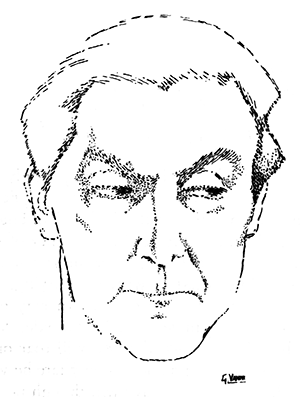Issue 19, Summer 1958
 Henry Green, 1958.
Henry Green, 1958.
Henry Green is a tall, gracious, and imposingly handsome man, with a warm, strong voice and very quick eyes. In speech he displays on occasion that hallmark of the English public school: the slight tilt of the head and closing of the eyes when pronouncing the first few words of some sentences—a manner most often in contrast to what he is saying, for his expressions tend toward parable and his wit may move from cozy to scorpion-dry in less than a twinkle. Many have remarked that his celebrated deafness will roar or falter according to his spirit and situation; at any rate he will not use a hearing aid, for reasons of his own, which are no doubt discernible to some.
Mr. Green writes at night and in many longhand drafts. In his memoir, Pack My Bag, he has described prose in this way:
Prose is not to be read aloud but to oneself alone at night, and it is not quick as poetry but rather a gathering web of insinuations which go further than names however shared can ever go. Prose should be a long intimacy between strangers with no direct appeal to what both may have known. It should slowly appeal to feelings unexpressed, it should in the end draw tears out of the stone ...
An ancient trade compliment, to an author whose technique is highly developed, has been to call him a “writer’s writer”; Henry Green has been referred to as a “writer’s writer’s writer,” though practitioners of the craft have had only to talk with him momentarily on the subject to know that his methods were not likely to be revealed to them, either then or at any other time. It is for this reason—attempting to delve past his steely reticence —that some of the questions in the interview may seem unduly long or presumptuous.
Mr. Green, who has one son, lives in London, in a house in Knightsbridge, with his beautiful and charming wife, Dig. The following conversation was recorded there one winter night in the author’s firelit study.
INTERVIEWER
Now, you have a body of work, ten novels, which many critics consider the most elusive and enigmatic in contemporary literature—and yourself, professionally or as a personality, none the less so. I’m wondering if these two mysteries are merely coincidental?
HENRY GREEN
What’s that? I’m a trifle hard of hearing.
INTERVIEWER
Well, I’m referring to such things as your use of a pseudonym, your refusal to be photographed, and so on. May I ask the reason for it?
GREEN
I didn’t want my business associates to know I wrote novels. Most of them do now, though ... know I mean, not write, thank goodness.
INTERVIEWER
And has this affected your relationships with them?
GREEN
Yes, yes, oh yes—why, some years ago a group at our Birmingham works put in a penny each and bought a copy of a book of mine, Living. And as I was going round the iron foundry one day, a loam molder said to me, “I read your book, Henry.” “And did you like it?” I asked, rightly apprehensive. He replied, “I didn’t think much of it, Henry.” Too awful.
Then, you know, with a customer, at the end of a settlement which has deteriorated into a compromise painful to both sides, he may say, “I suppose you are going to put this in a novel.” Very awkward.
INTERVIEWER
I see.
GREEN
Yes, it’s best they shouldn’t know about one. And one should never be known by sight.
INTERVIEWER
You have, however, been photographed from the rear.
GREEN
And a wag said: “I’d know that back anywhere.”
INTERVIEWER
I’ve heard it remarked that your work is “too sophisticated” for American readers, in that it offers no scenes of violence—and “too subtle,” in that its message is somewhat veiled. What do you say?
GREEN
Unlike the wilds of Texas, there is very little violence over here. A bit of child killing, of course, but no straight shootin’. After fifty, one ceases to digest; as someone once said: “I just ferment my food now.” Most of us walk crabwise to meals and everything else. The oblique approach in middle age is the safest thing. The unusual at this period is to get anywhere at all—God damn!
INTERVIEWER
And how about “subtle”?
GREEN
I don’t follow. Suttee, as I understand it, is the suicide—now forbidden—of a Hindu wife on her husband’s flaming pyre. I don’t want my wife to do that when my time comes—and with great respect, as I know her, she won’t ...
INTERVIEWER
I’m sorry, you misheard me; I said, “subtle”—that the message was too subtle.
GREEN
Oh, subtle. How dull!
INTERVIEWER
... yes, well now I believe that two of your books, Blindness and Pack My Bag, are said to be “autobiographical,” isn’t that so?
GREEN
Yes, those two are mostly autobiographical. But where they are about myself, they are not necessarily accurate as a portrait; they aren’t photographs. After all, no one knows what he is like, he just tries to give some sort of picture of his time. Not like a cat to fight its image in the mirror.
INTERVIEWER
The critic Alan Pryce-Jones has compared you to Jouhandeau and called you an “odd, haunted, ambiguous writer.” Did you know that?
GREEN
I was in the same house with him at Eton. He was younger than me, so he saw through me perhaps.




